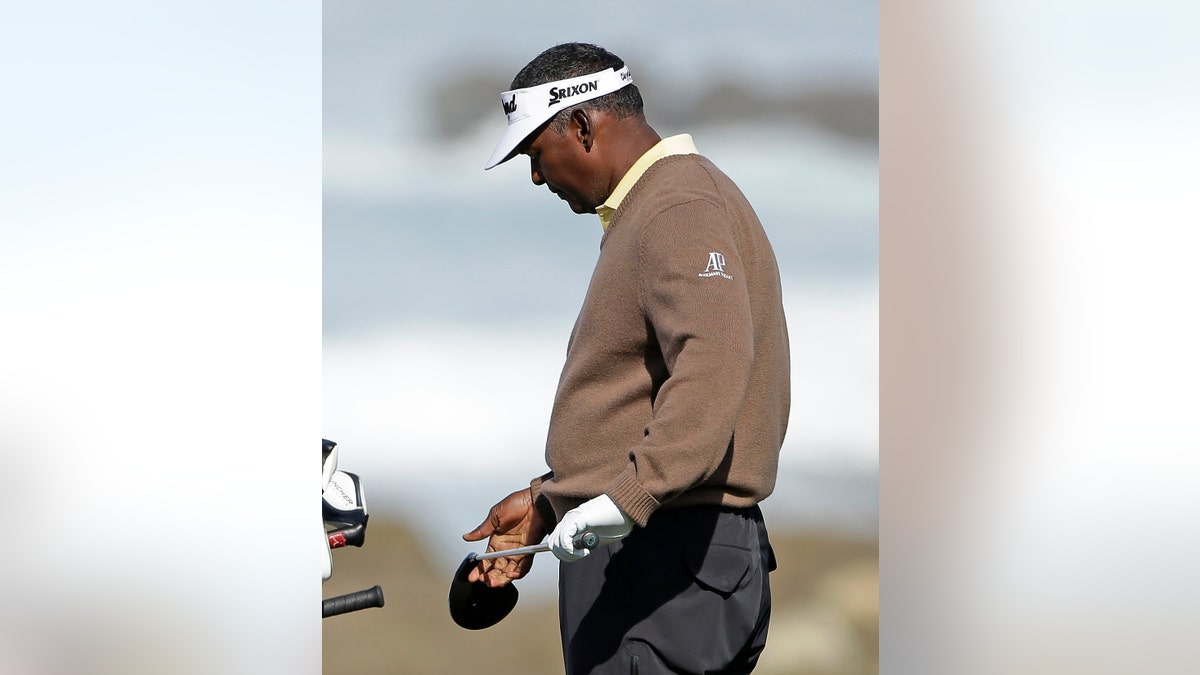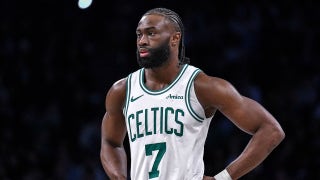
Vijay Singh, of Fiji, looks over his driver before hitting from the 13th tee of the Monterey Penisnula Country Club Shore Course during the second round of the AT&T Pebble Beach Pro-Am golf tournament on Friday, Feb. 8, 2013, in Pebble Beach, Calif. (AP Photo/Eric Risberg) (The Associated Press)
LOS ANGELES – This is one time the PGA Tour needs to avoid the perception of slow play.
It has been two weeks since the Sports Illustrated story that Vijay Singh spent $9,000 on products that included deer antler spray, telling the magazine he used the spray "every couple of hours ... every day" and that he was "looking forward to some change in my body." Singh issued a statement the next day that he used the spray and was shocked to learn it might contain a substance that is banned under the tour's anti-doping policy.
Singh is still playing.
The tour is not talking, except to say it is looking into the matter.
In what is shaping up as a bright year in golf, this is becoming a dark cloud. Tiger Woods won at Torrey Pines. Phil Mickelson missed a 59 by a fraction of an inch when he won the Phoenix Open. The next week, every conversation among players at Pebble Beach seemed to start with the same question.
"What's going to happen with Vijay?"
Singh met with PGA Tour Commissioner Tim Finchem at Pebble Beach, and then made his 15th consecutive cut.
He is playing again this week at Riviera.
The big Fijian, a week away from turning 50, is one of the more remarkable success stories on the PGA Tour. He has three major championships, a record 22 wins in his 40s and a spot in the World Golf Hall of Fame.
But he is looked upon differently now, and not just because he is the source of jokes.
One photo circulating last week showed Singh's face photo-shopped on a deer. A magazine reported seeing Singh in the fairway at Spyglass Hill during a practice round with his caddie, trainer, manager — and five deer that had wandered out of the woods.
Also at stake is his integrity.
It doesn't help that Singh had to overcome allegations early in his career that he doctored his scorecard to avoid missing the cut in Indonesia. Singh, who has denied the charges, was banned by the Asian tour. It dogged him for so much of his career, even as he worked his way out of the jungle in Borneo to become No. 1 in the world.
He hasn't won since 2008, when he was the FedEx Cup champion with back-to-back wins in the playoffs. He has been slowed by injuries the last four years. Clearly, he was trying to gain an edge with the deer antler spray and other products from Sports with Alternative to Steroids.
Singh either forgot or ignored the tour's warning a year earlier that deer antler spray might contain an insulin-like growth hormone known as IGF-1, which has been on the list of banned substances since the program began in 2008.
Every now and then, the tour will warn the players of a substance that could get them into trouble, which is what it did in the fall of 2011.
Singh said he reviewed the list of ingredients on the antler spray and did not see any banned substances.
That's not being very vigilant. And it's not much of an excuse.
If he's spending $9,000 on products, does he not become suspicious enough to run this by the tour? Even a change in their nutrient program should be enough for players to ask questions. One player told a story Tuesday of getting a prescription for a new eye medicine. His first call was to the tour to make sure it was OK. The prescription cost $10.
Just as much is at stake for the integrity of the tour.
Doug Barron is the only player who has been suspended under the anti-doping policy, which didn't cause too much of a ripple because only the hard-core golf fans had even heard of him. Singh is a Hall of Famer. The longer this drags on, the more speculation that the tour treats stars differently.
What hurts the tour in this case is its longtime lack of transparency.
Finchem has decided that no news is the best news when it comes to player discipline. The tour does not disclose fines or suspensions for conduct. No one can say for certainty that Woods has ever been fined for his course language, or if Mickelson was fined last year for using his cell phone in the middle of a round at the Memorial to complain about too many cell phones in the gallery.
We know John Daly was suspended, but only because he called The Associated Press to refute rumors he had been suspended for life (it was only six months).
Players suspect that at least two of their colleagues have been suspended from testing positive for recreational drugs. If true, the tour won't say.
Golfers are not choir boys.
Finchem wants to protect the image of golf, which is one reason he refuses to publicize their indiscretions, however large or small. That image is not derived exclusively from clean living, but from the very nature of the sport. It's a congenial game, and the vast majority of the pros are respectful of the sport and those who play it. That's why golf has such a good image, and is so appealing to the corporate world.
Under the anti-doping policy, the tour is required to disclose the name, confirm the violation and declare the penalty.
So far, there has been silence.
This is not a call for the tour to rush to judgment. Singh's case is muddled. Yes, a player who admits to using a banned substance is the same as a player testing positive. But is there evidence that IGF-1 was in the spray that Singh was using? More than one doctor has said it's impossible for IGF-1 to enter the blood system through a spray. And the tour does not have a blood test, anyway.
Plus, players have the right to appeal, and the policy says a hearing must take place within 45 days.
Singh brought this mess on himself, and now is the time for him to give back to the game that has provided him with so much. Singh could eliminate this distraction by taking a leave of absence until the tour sorts this out. The sooner the better.








































